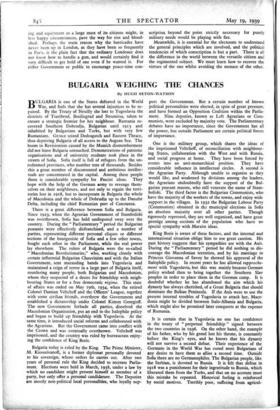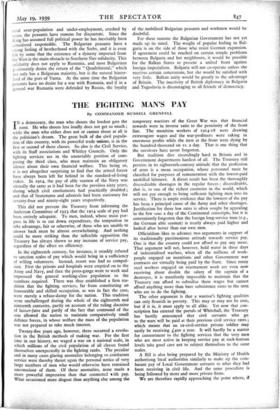BULGARIA WEIGHING THE CHANCES
By HUGH SETON-WATSON BULGARIA is one of the States defeated in the World War, and feels that she has several injustices to be re- paired. By the Treaty of Neuilly she lost to Yugoslavia the districts of Tsaribrod, Bosiliegrad and Strumitsa, taken to ensure a strategic frontier for her neighbour. Rumania re- covered Southern Dobrudja, Bulgarian until 1913 and inhabited by Bulgarians and Turks, but with very few Rumanians. Greece seized Dedeagatch and Eastern Thrace, thus depriving Bulgaria of all access to the Aegean Sea. The boom in Revisionism caused by the Munich dismemberment did not leave Bulgaria untouched. Demonstrations of patriotic organisations and of university students took place in the streets of Sofia. Sofia itself is full of refugees from the un- redeemed provinces, who number tens of thousands. Besides this a great number of discontented and ambitious intellec- tuals are concentrated in the capital. Among these people there is considerable sympathy for Fascist ideas. They hope with the help of the German army to revenge them- selves on their neighbours, and not only to regain the terri- tories lost in 1918, but to incorporate in Bulgaria the whole of Macedonia and the whole of Dobrudja up to the Danube Delta, including the chief Rumanian port of Constanza.
There is a great difference between Sofia and Bulgaria. Since 1923, when the Agrarian Government of Starnboliski was overthrown, Sofia has held undisputed sway over the country. During the " Parliamentary " period the Bulgarian peasants were effectively disfranchised, and a number of parties, representing different personal cliques or different sections of the bourgeoisie of Sofia and a few other towns, fought each other in the Parliament, while the real power lay elsewhere. The rulers of Bulgaria were the so-called "Macedonian Revolutionaries," who, working closely with certain influential Bulgarian Chauvinists and with the Italian Government, sent marauding bands into Yugoslavia and maintained a reign of terror in a large part of Bulgaria itself, murdering many people, both Bulgarian and Macedonian, whom they suspected of a desire for friendship with neigh- bouring States or for a free democratic regime. This state of affairs was ended on May r9th, 1934, when the retired Colonel Damian Veltcheff and the Officers' League, together with some civilian friends, overthrew the Government and established a dictatorship under Colonel ICimon Georgieff. The new Government forbade all parties, dissolved the Macedonian Organisation, put an end to the Italophile policy and began to build up friendship with Yugoslavia. At the same time, it introduced social reforms and collaborated with the Agrarians. But the Government came into conflict with the Crown and was eventually overthrown. Veltcheff was imprisoned, and the country was ruled by bureaucrats enjoy- ing the confidence of King Boris.
Bulgaria today is ruled by the King. The Prime Minister, M. Kiosseivanoff, is a former diplomat personally devoted to his sovereign, whose orders he carries out. After two years of personal rule the' King decided to recreate Parlia- ment. Elections were held in March, 1938, under a law by which no candidate might present himself as member of a party, but only offer a personal candidature. The Deputies are mostly non-political local personalities, who loyally sup- port the Government. But a certain number of known political personalities were elected, in spite of great pressure, and have formed an Opposition Coalition within the Parlia- ment. Nine deputies, known as Left Agrarians or Com- munists, were excluded by majority vote. The Parliamentary debates have no importance, since the Government has all the power, but outside Parliament are certain political forces of importance.
One is the military group, which shares the ideas of the imprisoned Veltcheff, of reconciliation with neighbour- ing States, collaboration with the West and with Russia, and social progress at home. They have been forced by events into an anti-monarchical position. They have considerable influence in intellectual circles. A second is the Agrarian Party. Although unable to organise as they would like, and weakened by divisions among the leaders, the Agrarians undoubtedly have the support of the Bul- garian peasant masses, who still venerate the name of Stam- boliski. The third factor is the Bulgarian Communists, who have the majority of the workers of the towns, and enjoy wide support in the villages. In 1932 the Bulgarian Labour Party (Communists) obtained in the municipal elections in Sofia an absolute majority over all other parties. Though rigorously repressed, they are well organised, and have great prestige among sections of the population who have no special sympathy with Marxist ideas.
King Boris is aware of these factors, and the internal and international situation oblige him to use great caution. His past history suggests that his sympathies are with the Axis. During the " Parliamentary " period he did nothing to dis- courage the Macedonian terrorists, and by his marriage to Princess Giovanna of Savoy he showed his approval of the Italophile policy. In recent years he has allowed rapproche- ment with Yugoslavia, but this was mainly because German policy wished then to bring together the Southern Slav peoples in order to place them in the German camp. It is doubtful whether he has abandoned the aim which his dynasty has always cherished, of a Great Bulgaria that should dominate the Balkan Peninsula. If the Axis were to use the present internal troubles of Yugoslavia to attack her, Mace- donia might be divided between halo-Albania and Bulgaria, which might also be promised later conquests at the expense of Rumania.
It is certain that in Yugoslavia no one has confidence in the treaty of "perpetual friendship" signed between the two countries in 1936. On the other hand, the example of his father, who by his greed lost his throne, is constantly before the King's eyes, and he knows that his dynasty will not survive a second defeat. Their experience of the Germans in the World War has cured most Bulgarians of any desire to have them as allies a second time. Outside Sofia there are no Germanophiles. The Bulgarian people, like the Serbian, is devoted to Russia. It is felt that defeat in 1918 was a punishment for their ingratitude to Russia, which liberated them from the Turks, and that on no account must this mistake be repeated. Historical feeling is reinforced by social motives. Terribly poor, suffering from agricul- tural over-population and under-employment, crushed by taxes, the peasants have reasons for discontent. Since the King has assumed full political power he has inevitably been considered responsible. The Bulgarian peasants have a strong feeling of brotherhood with the Serbs, and it is even felt by some that the existence of a dynasty imported from the West is the main obstacle to Southern Slav solidarity. This solidarity does not apply to Rumania, and most Bulgarians passionately desire the return of the "Quadrilateral," which not only has a Bulgarian majority, but is the natural hinter- land of the port of Varna. At the same time the Bulgarian peasants have no desire for a war with Rumania, and if in a general war Rumania were defended by Russia, the loyalty of the mobilised Bulgarian peasants and workmen would be doubtful.
For these reasons the Bulgarian Government has not yet made up its mind. The weight of popular feeling in Bul- garia is on the side of those who resist German expansion. If agreement could be reached on certain simple problems between Bulgaria and her neighbours, it would be possible for the Balkan States to present a united front against foreign imperialism. Bulgaria will not co-operate unless she receives certain concessions, but she would be satisfied with very little. Balkan unity would be greatly to the advantage of Britain. The inactivity of British diplomacy in Bulgaria and Yugoslavia is discouraging to all friends of democracy.



















































 Previous page
Previous page